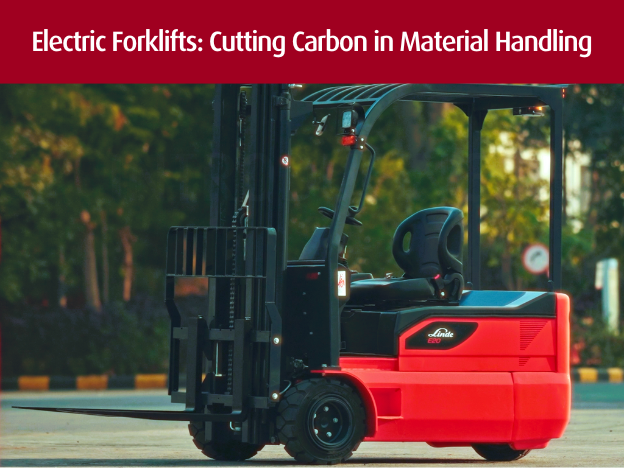Did you know that switching to electric forklifts can save businesses up to five tonnes of carbon emissions annually for each vehicle?
The material handling sector is undergoing a transformational change with the adoption of electrical forklifts. Sustainability has emerged as a crucial focus for businesses striving to reduce their environmental effect in today’s rapidly evolving market. These vehicles not only enhance operational performance but additionally play a significant function in lowering carbon emissions and fostering a greener future.
The Environmental Impact of Traditional Forklifts
Traditional forklifts powered by internal combustion engines have long been the spine of material handling operations. However, they commonly contribute to air pollutants and greenhouse gas emissions. With growing regulatory pressures and societal expectations for cleaner operations, many companies are now reconsidering their reliance on fossil fuel powered machines.
Electric Forklifts: A Sustainable Alternative
Electric forklifts present a compelling option to their ICE counterparts. By operating solely on electricity, they produce 0 tailpipe emissions, significantly reducing the carbon footprint related to material handling activities. This shift not only contributes to better indoor air but also aligns with global efforts to fight climate change issues.
The transition to electric forklifts can result in significant reductions in greenhouse gas emissions. As stated at the start of the blog, changing to electric powered forklifts can reduce up to 5 tonnes of carbon emissions yearly for every car in operation. This reduction is essential for organisations seeking to make their sustainability profiles better while complying with increasingly stringent environmental rules.
Energy Efficiency and Cost Savings
Electric forklifts are inherently more power-efficient than conventional models. They convert a higher percentage of input energy into usable work, which in turn lead to lower energy intake and operational expenses. Recent advancements in the battery technology, along with lithium-ion batteries, have in addition advanced the efficiency and lifespan of these automobiles. As a result, businesses can reduce power bills and longer operational hours without frequent recharging.
Noise Reduction Benefits
In addition to their environmental advantages, electric forklifts operate much more quietly than traditional models. This noise reduction not only creates a more pleasant working environment for employees but also minimizes noise pollution in surrounding communities. As businesses become increasingly aware of their social responsibilities, adopting quieter electric forklifts can enhance corporate image while promoting employee well-being.
Integration with Renewable Energy Sources
The sustainability benefits of electric forklifts are further amplified when paired with renewable energy sources. Companies can power their electric fleets using solar, wind, or hydroelectric power, significantly reducing reliance on non-renewable fossil fuels. This integration not only decreases operational costs but also enhances the overall environmental sustainability of material handling operations.
By investing in renewable energy solutions alongside electric forklifts, businesses can create a closed-loop system that maximizes efficiency while minimizing environmental impact. This holistic approach aligns with global sustainability goals and positions companies as leaders in responsible business practices.
Lifecycle Sustainability
The lifecycle impact of electric forklifts is another critical factor contributing to their sustainability credentials. Unlike traditional vehicles that generate waste from oil changes and other maintenance activities, electric forklifts minimize waste generation significantly. The batteries used in these vehicles are recyclable; more than 98% of battery lead is recycled, ensuring that valuable materials are reused rather than discarded.
Furthermore, the reduced need for consumables such as oil filters and coolant fluids leads to less waste generation overall. This aspect of life cycle sustainability is becoming increasingly important as businesses strive to adopt circular economy principles within their operations.
Conclusion
Embracing sustainability in material handling through the adoption of electric forklifts represents a significant step forward for businesses aiming to reduce their carbon footprint. With zero emissions at the point of use, enhanced energy efficiency, lower operational costs, noise reduction benefits, and lifecycle sustainability advantages, electric forklifts offer a compelling case for companies looking to align their operations with environmentally responsible practices.
At Linde Material Handling India, we are committed to providing high-quality electric forklifts designed for optimal performance while minimizing environmental impact. Our advanced technology ensures that your business not only meets its sustainability goals but also enhances productivity and cost-effectiveness.
Contact Linde Material Handling at https://www.lindemhe.com for all your material handling needs and experience the difference our world-class equipment can make for your business as we drive towards a sustainable future together.

